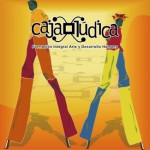
Caja Lúdica
This weekend Simón and I went to Rabinal with José Osorio and other “Lúdicos,” or members of the Caja Lúdica Collective, a non-profit which promotes peace through the exhibition and teaching of artistic activities such as drama, dance, acrobatics and stilt-walking to promote a culture of peace in communities rocked by violence. The group aims to help marginalized youngsters including gang members discover a sense of purpose and worth. This year, 3 “Ludicos” were assassinated with no sign of who killed them and if the deaths were linked. Earlier this week, Lucia, Simón and I met with Jose and other Lúdicos to inform them about whom MIA is and describe “Hombres Contra Feminicidio” and that’s how it was decided that Simón and I would do two workshops in Rabinal this weekend.
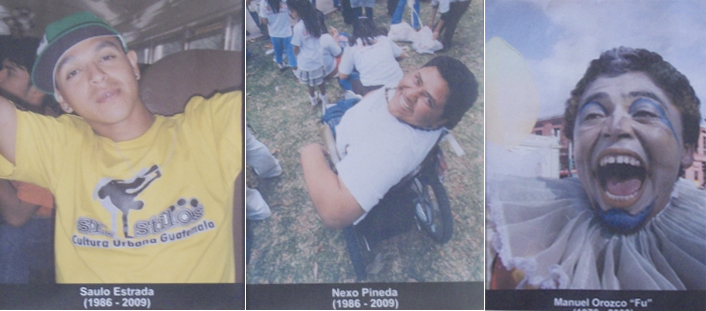
The 3 Lúdicos who were killed this year; picture taken at the Caja Lúdica headquarters in Zone 1.
In the capital, whenever anyone mentions or hears about someone going to Rabinal there’s always this air of importance and a certain level of reverence. On the drive over (we were totally spoiled by Caja Lúdica and riding in a nice, new 4 wheel drive truck) Jose let me know what the big deal was with Rabinal and I was able to understand why Simon had been telling me for so long that we should bring the workshops there. It turns out that Rabinal is a predominantly indigenous area which suffered some of the bloodiest and terrifying massacres during Guatemala’s 36 year civil war. The majority of the residents are Maya Achí and speak Achí as well, which is one of the over 20 Mayan languages in Guatemala. The massacres occurred mainly in 1981-1982, two of the most well known having taken place in the villages of Plan de Sánchez and Río Negro. MiMundo.org, an amazing English/Spanish blogspot about Guatemala has great recent articles about both massacres which can be found at the above links. To quote MiMundo.org:
“Beginning halfway through 1981 and throughout 1982, the Guatemalan Army carried out numerous military operations… The objective of these was to eradicate the guerrilla army’s support base in the rural area, which was made up mostly of civilians. Within this context we cite a famous quote from former Chinese Prime Minister Mao Zedong: ‘take away the water from the fish’. Such metaphor implies that the guerrilla forces needed the civilian population just like fish need water… Within this logic, the Guatemalan Army carried out in Rabinal numerous collective killings against a mostly indigenous and unarmed civil population so as to indirectly eliminate the guerrillas.” (8)
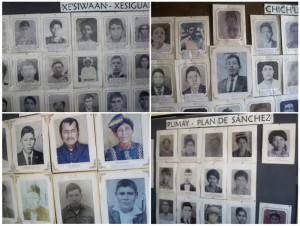
The Museum was a room filled with photographs of the dead and disappeared and under each photograph was information on the person’s life and death depending on what is known.
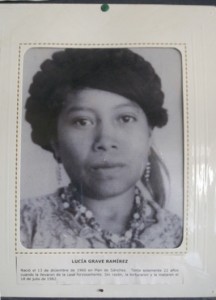
A close up of one of the photos. Translation below: Lucia Grave Ramirez: Born on December 13, 1960 in Plan de Sanchez. She was only 22 years old when they forcibly removed her from her house and tortured and killed her without reason on July 18, 1982.
Once we arrived to Rabinal (it was about a four hour drive), Jose immediately had to have a full day of meetings at the Centro Cultura Maya Achí, the center that we would be doing the workshops in. Simón and Jose’s partner Violeta and I got dropped at the house that Caja Lúdica has in Rabinal to use when there and we then walked to the Rabinal Achi Community Museum, which helps honors the historical memory of the people who were killed and disappeared in the various massacres and displays the local Maya Achi art, handicrafts, and information on their famous dances.
The museum was hard to look at because I wanted to read all the bios and became quickly overwhelmed by the sadness and injustice of it all. Reading time after time that farmers and homemakers were killed by machine guns and that countless people were tortured and raped was emotionally draining.
That night I had to mentally prepare for my first workshop where I was half-responsible for the facilitation. In reality, I have years of experience in this facilitating workshops for the purposes of violence prevention, but this was particularly stressful because I suddenly had to do it in Spanish, a language I am still trying to become comfortable using.
The next day we did our first workshop and it was scary but successful in that the “students” were engaged and had a lot of ideas about how we can change the gender power dynamic through personal growth and how we run our own households.
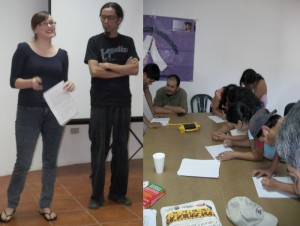
Simon and I facilitating. / The students doing a partner-exercise
The next day I was a lot less stressed about facilitating in Spanish since I had finally done it for the first time the day before. This time I felt a lot more comfortable being a bit more spontaneous and the students this time were a little younger, which MIA aims for since “Hombres Contra Feminicidio” is meant to be preventative.
The next day I was a lot less stressed about facilitating in Spanish since I had finally done it for the first time the day before. This time I felt a lot more comfortable being a bit more spontaneous and the students this time were a little younger, which MIA aims for since “Hombres Contra Feminicidio” is meant to be preventative.
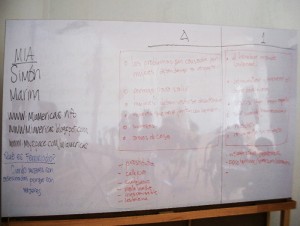
The board after one of our exercises
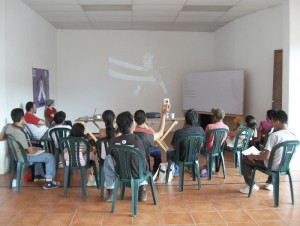
Watching the film “The Impossible Dream”
Today, Sunday, August 23 was our second and last workshop and afterward we took the long ride home. Tomorrow Lucia and I are going to the University Radio Station in the morning because she has another interview about the campaign.





